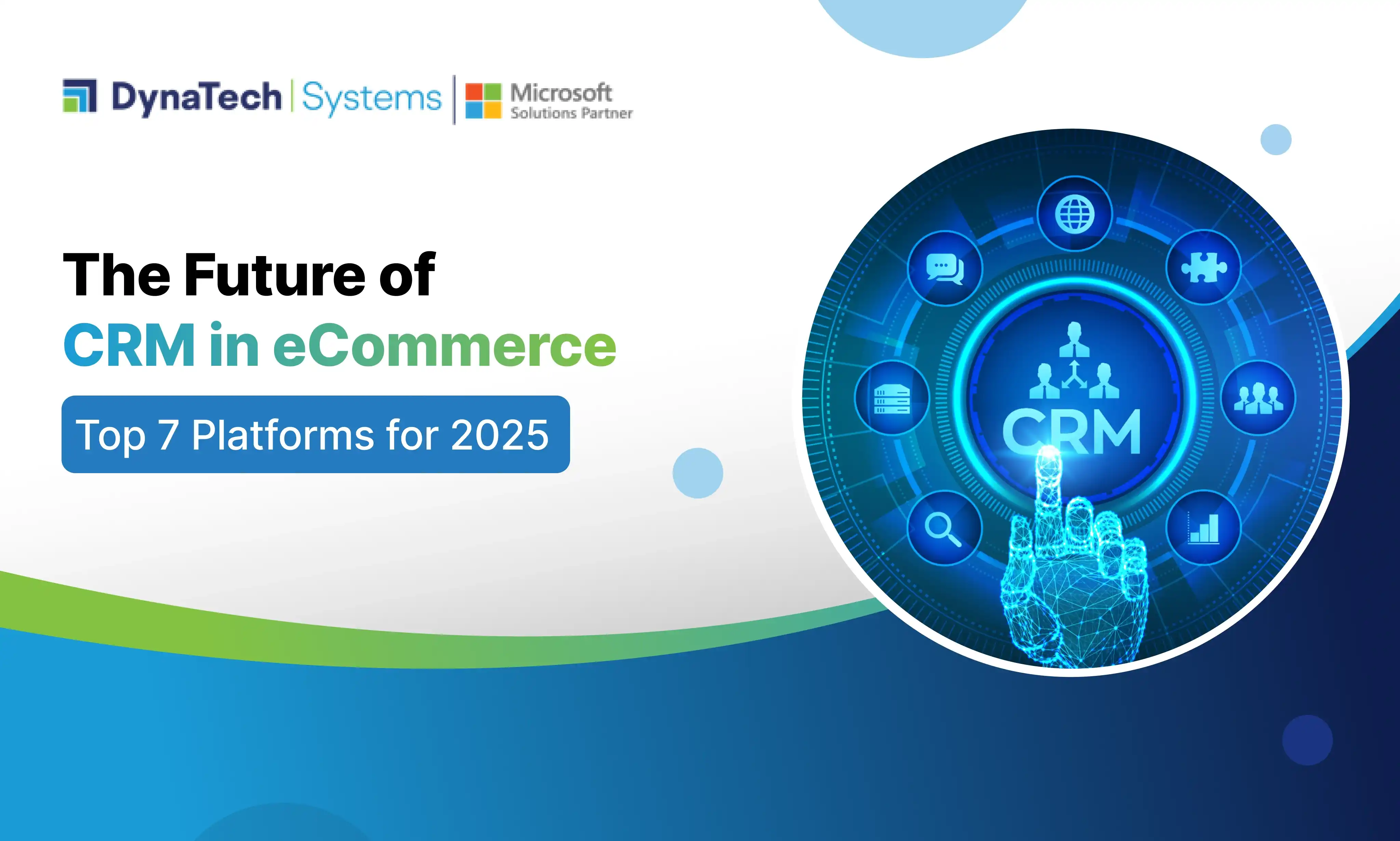If you’re an eCommerce brand in 2025, standing still is falling behind. Customer expectations have evolved at warp speed — personalization is no longer optional, loyalty is elusive, and fragmented buyer journeys demand a unified strategy. Enter CRM for eCommerce. Not just any CRM, but platforms built to read your customer like a story, act in real-time, and scale with your ambitions. One such popular platform is Dynamics 365 for eCommerce industry and there are a lot more available in the market.
Before we dive into the top CRM platforms for eCommerce in 2025, let’s ask the real question — what do modern eCommerce businesses really need from a CRM?
The Surge of CRM in eCommerce
The global CRM market is projected to reach $157.53 billion by 2030, underscoring its critical role in business growth. For eCommerce businesses, CRM systems are no longer optional—they're vital tools for managing customer interactions, analyzing data, and driving sales.
Top 7 eCommerce CRM Platforms for 2025
Table: CRM Snapshot Comparison – At a Glance
|
CRM Platform |
Best For |
Starting Price |
AI Features |
Integrations |
Free Trial |
USPs |
|
Dynamics 365 for eCommerce |
Mid to large-scale eCommerce firms |
Custom (Based on modules) Sales module starts at $65/month |
AI Copilot, sentiment analysis, predictive insights |
Microsoft apps, Shopify, SAP, Power Platform, FedEx, PayPal |
Yes (30 days) |
Enterprise-grade CRM with deep eCommerce + ERP integration |
|
HubSpot CRM |
Startups & growing eCommerce brands |
Free (Starter at $20/mo) |
Predictive lead scoring, AI email writer |
Shopify, WooCommerce, Zapier, Gmail, Salesforce |
Yes (14 days) |
Free forever plan, user-friendly interface |
|
Zoho CRM |
Budget-conscious small eComm stores |
From $20/user/month |
Zia AI assistant, sales predictions |
Shopify, Magento, Mailchimp, Slack |
Yes (30 days) |
Omnichannel CRM with deep personalization and analytics |
|
Nutshell |
Small teams with simple operations |
From $16/user/month |
AI email templates, deal insights |
Gmail, Outlook, Shopify, Zapier |
Yes (14 days) |
All-in-one sales + marketing CRM for lean teams |
|
Pipedrive |
Sales-driven eCommerce teams |
From $14/user/month |
AI sales assistant, deal monitoring |
Shopify, Mailchimp, Trello, QuickBooks |
Yes (14 days) |
Visual pipeline, powerful automation, lead gen tools |
|
Salesforce Customer 360 |
Large enterprises, omnichannel brands |
From $25/user/month |
Einstein AI, personalized journeys, chatbots |
Shopify, SAP, Oracle, AWS, Slack |
Yes (30 days) |
Market leader in enterprise AI, scalability, and 360° customer view |
|
Omnisend |
DTC & marketing-heavy eCommerce brands |
Free (Paid from $16/month) |
AI segmentation, predictive sending |
Shopify, BigCommerce, WooCommerce, Zapier |
Yes (Free plan) |
Built exclusively for eCommerce – email + SMS + push automation |
1. Microsoft Dynamics 365 – The Smart Brain of eCommerce

Overview:
If there’s one CRM that deserves the “future-proof” tag, it’s Microsoft Dynamics 365. Especially in the eCommerce industry, it’s more than just a CRM — it’s a digital nervous system. With native integration across Microsoft’s cloud, AI, ERP, and Copilot, it’s an ecosystem designed for scale.
Key Features:
- AI-powered customer insights with Copilot
- Advanced product recommendation engine
- Integration with Shopify, Magento, and custom-built storefronts
- Native financials, inventory, and fulfillment via F&O and SCM
- Real-time sentiment analysis & conversation intelligence
Best For:
Mid to large-sized enterprises, omnichannel retailers, global eCommerce operations
Benefits:
- 360° customer view with cross-touchpoint data
- Integrated marketing + finance + operations stack
- Predictive analytics and proactive service tools
Pricing:
- Offers 30 days Free Trial
- Starts at $65/user/month for Sales module; enterprise pricing varies by deployment
Why Pick It?
If you want the best CRM software for eCommerce that’s ready for the Copilot era, Dynamics 365 wins hands down.
2. HubSpot – The Powerhouse for SMB eCommerce

Overview:
Easy to use, fast to deploy, and heavily focused on inbound marketing, HubSpot CRM has become the darling of small eCommerce firms.
Key Features:
- Email marketing automation and Contact Management
- Customizable pipelines for sales workflows
- Integration with Shopify, WooCommerce
- Lead scoring and behavioral tracking
- Customer Segmentation
Best For:
SMBs, B2B eCommerce, startups looking for scale without complexity
Benefits:
- No code needed to get started
- Large library of integrations and templates
- Highly visual and intuitive dashboard
Pricing:
- Offers a free version with limited features
- Paid plans start at $20/seat/month (premium features)
Why Pick It?
One of the best CRM for small eCommerce business owners who want powerful tools without the complexity or enterprise pricing.
3. Nutshell – Simple, Smart CRM for Growing eCommerce Brands

Overview:
Nutshell is a clean, no-fuss CRM built for small and mid-sized businesses that want powerful sales automation and reporting — without getting lost in enterprise jargon. It's great for those who want speed, simplicity, and support that actually supports.
Key Features:
- Lead nurturing and pipeline management
- Easy integrations with Shopify and Gmail
- Built-in email marketing
- Team collaboration tools and pipeline automation
Best For:
SMBs, small teams, service-based and product-based eCommerce businesses
Benefits:
- Easy to use, great UI
- Rapid onboarding with real-time support
- Affordable yet full-featured
Pricing:
Starts at $16/user/month. Pro plans offer sales automation and reporting.
Why Pick It?
If you're a growing eCommerce brand looking for the best CRM for small eCommerce business that's intuitive yet powerful — Nutshell is a worthy choice.
4. Zoho CRM – Lean, Clean, and Affordable

Overview:
Zoho is not the most popular CRM, but it’s incredibly efficient. With a modular ecosystem, Zoho is ideal for small teams needing performance without the price tag.
Key Features:
- Inventory and order management add-ons
- Omnichannel communication tools
- Workflow automation
- Zia AI assistant (basic level AI)
- Sales process automation
- Real-Time customer insights
Best For:
Budget-conscious SMBs, solopreneurs, small retail sellers
Benefits:
- Cost-effective with top-notch functionality
- Deep integration with Zoho ecosystem
- Easy to customize and scale
Pricing:
Starts at $20/user/month
Why Pick It?
If you're looking for the best CRM for small eCommerce business, Zoho is surprisingly powerful for its price.
5. Pipedrive – CRM Designed for Sales-First eCommerce Teams

Overview:
Pipedrive is a sales-focused CRM built to help your team sell smarter and faster. It’s perfect for B2B or hybrid eCommerce firms that want to move leads through custom pipelines with full visibility.
Key Features:
- Drag-and-drop sales pipelines
- Email marketing
- Lead segmentation and activity tracking
- Smart contact data enrichment
- Workflow automation and reporting
- Quote and order management
Best For:
Sales-focused teams in eCommerce, B2B eCommerce players, agencies with productized services
Benefits:
- Laser focus on converting leads to customers
- Customizable dashboards and reports
- Easy API integration and chatbot tools
Pricing:
- 14 Days Free Trial
- Starts at $14/user/month
Why Pick It?
If you're hunting for the best CRM software for eCommerce where sales automation is king, Pipedrive delivers without the learning curve.
6. Salesforce Customer 360 – The Heavyweight for Enterprise eCommerce

Overview:
Salesforce Customer 360 isn’t just a CRM — it’s the Rolls Royce of customer experience. It's designed for enterprises that want a unified view across commerce, marketing, service, and data.
Key Features:
- Unified customer profiles across every touchpoint
- Email marketing
- Quote management and sales forecasting
- Einstein AI for real-time personalization
- Partner and channel management
- Advanced segmentation and multi-touch attribution
Best For:
Large-scale and multi-brand enterprises, omnichannel commerce giants
Benefits:
- Centralized customer intelligence
- Personalization at scale with AI
- Strong analytics and compliance tools
Pricing:
- Plans start at $25/user/month.
- Offers custom pricing based on features and scale.
- Enterprise-grade cost with enterprise-grade power.
Why Pick It?
For those who want the ultimate online CRM systems for eCommerce industry, Salesforce Customer 360 is the no-compromise option.
7. Omnisend – Marketing Automation Meets eCommerce CRM

Overview:
Omnisend is purpose-built for eCommerce and shines in the realm of marketing automation. From email campaigns to SMS and push notifications, it’s crafted to engage customers where they are.
Key Features:
- Email & SMS automation flows
- Audience targeting
- Prebuilt eCommerce workflows
- Dynamic segmentation
- Real-time campaign analytics
- Omnichannel Marketing
Best For:
DTC brands, Shopify/WooCommerce/BigCommerce users, email-heavy businesses
Benefits:
- Strong ROI with low complexity
- Pre-built automations save time
- Excellent for abandoned cart and win-back campaigns
Pricing:
- Free plan available.
- Paid plans from $16/month based on email volume.
Why Pick It?
For eCommerce brands that want ecommerce CRM software with robust omnichannel marketing, Omnisend is a true value driver.
Must-Know Tips While Choosing the Best CRM for Your eCommerce Business
- Go Beyond Contacts – Modern CRM must unify data across sales, service, marketing, fulfillment, and finance.
- Integration Capabilities– Your CRM should work with your eCommerce platform, payment gateway, and email tools effortlessly.
- Think Scalability – Don't just buy for today. Pick something that grows with your revenue as well as customer base.
- Evaluate AI Capabilities – 2025 is all about intelligent nudges, proactive selling, and Copilot-like automation.
So, What’s the Best CRM for eCommerce in 2025?
There’s no single crown-wearer—only the perfect fit. That fit is also based on your business model, growth, and sales DNA. So here’s your rapid-fire decision guide:
- Want enterprise-grade AI, robust eCommerce-ERP synergy, and financial intelligence? → Microsoft Dynamics 365 for eCommerce
- Just starting out and need simplicity with scalability? → HubSpot or Zoho CRM
- Heavy on omnichannel marketing and automation? → Omnisend
- Focused on sales pipelines and automation for smaller teams? → Pipedrive
- Want easy-to-use all-in-one CRM for lean teams? → Nutshell
- Building a massive, connected customer universe with deep AI? → Salesforce Customer 360
Each of these ecommerce CRM software options brings something distinct to the table—whether it's deep insights, clean UI, or integrations galore. So, align your goals, compare your options, and let your CRM drive growth like never before.
Final Word
Choosing the best CRM software for eCommerce is no longer just about tracking customers. It’s about creating connected journeys, empowering your team with insights, and winning repeat customers with intelligent personalization. As the CRM landscape continues to evolve in 2025, your decision today can determine your trajectory tomorrow.
Looking for an all-in-one, AI-driven, secure CRM that connects with your eCommerce storefront and financial backend?
Try DynaTech’s Dynamics 365 CRM solutions for eCommerce — built to scale with your ambitions.
Image Sources
webfx.com/industries/retail-ecommerce/ecommerce/crm/
omnisend.com/blog/ecommerce-crm/




























